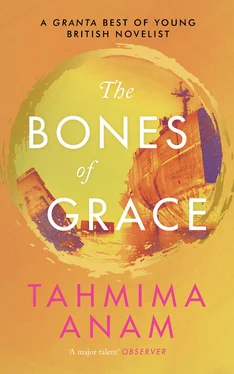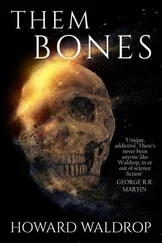‘Something like that,’ he said. Sohail finished his prayer and withdrew his gaze from the ceiling. We heard Nanu moving around the kitchen, the clatter of plates and cups.
‘Looking back,’ Abboo continued, ‘We made some errors, in the way we—’
‘It was my fault,’ Ammoo interrupted. ‘It was me. There was nothing wrong with your father. I was the problem.’ She stood up and circled the room. From the kitchen came the rising and rising sound of the boiling kettle.
‘Come here, jaan,’ Abboo said, and Ammoo obeyed, returning to sit beside him. I could see them very young now, their faces lean and tired, grappling with things beyond their control, images from the war, and the sparse, mysterious future before them.
‘For a long time I didn’t think about children,’ Ammoo said. ‘But then suddenly I did, and when I did I felt a sort of desperation. We tried everything, spent all our money.’ She smoothed the pleats of her sari. ‘Anyway, the point is, the silence — your father did it to protect me. We never talked about it. The few people who knew, they just assumed it was him, and because of the war, no one asked.’
‘But what about me?’ I said, wanting to remain angry. ‘You never wanted to tell me any of this?’
‘We wanted so badly for you to be ours,’ my father said. ‘We were selfish. We’re so very sorry.’
Nanu returned with the tea. She sat down and busied herself with pouring and adding powdered milk, sugar. Sohail passed around the cups, placing one in front of me, patting my head as he moved heavily back to his chair.
‘There’s more, I know there’s more. Dolly said she lost all the records of my adoption. How could that be?’
Ammoo’s eyes fell to the floor. ‘You tell her,’ she whispered. ‘I can’t bear to think about it.’
I could see Abboo struggling to form the words. I wanted to tell them I loved them, that my life wasn’t so bad, that I knew they had done their best. I wanted to feel sorry for Ammoo for the burden she’d been carrying around all these years, but the urge to be harsh was stronger. You, Elijah, of all people, will know that I was capable of being cruel. I looked around and they were all staring at me and the air seemed to wrap itself around my mouth. I ignored my father’s outstretched arms, the soft sobs of my mother. ‘You know what this makes me? Not knowing who I am? It makes me half a person.’
‘It was a terrible time,’ I heard Sohail say. His voice was steady. ‘We all did things in the war, and we’ve all found ways to make peace with those things.’
‘Did you kill anyone?’
‘That’s not what he means,’ Abboo said. ‘After the war, everyone was looking for meaning, for something that would help us to make sense of what happened. For some people, it was their work — lot of money people made. And sometimes’ — he looked at Sohail now — ‘it was religion.’
‘For us it was a baby,’ Ammoo said. ‘We wanted a baby to erase all our pain.’ I looked at her and saw that she was pulling it out of herself with tremendous pain and effort, like a demonic spirit that had lodged itself between her ribs and had to be exorcised. As she spoke, her voice grew in volume and confidence. ‘So when we couldn’t — when I couldn’t — you won’t understand, it’s something so deep, the inability to bear a child.’
I took a sip of tea, burning my tongue.
‘We didn’t want to have any contact with — her — your mother. It was too difficult. So we let Dolly and Bulbul handle everything, and then we asked them to destroy the evidence. Once you were legally ours, we just wanted to forget you had ever belonged to anyone else.’
I didn’t know what to say. Their reasons for wanting to erase the adoptedness of their child — me — was not unreasonable. It was born out of a need to love and be loved, I could see that now and I believed it. But it also meant they must have, on some level, been ashamed — not in the way some might have thought, and I had always feared — that my roots were somehow contaminated by poverty, or bad luck, or misfortune — but ashamed of themselves, and maybe ashamed was not even the right way to describe it — more that it was a terrible thing, the fact that I’d had to come from somewhere other than my mother’s womb, that I wasn’t made of them in the way they had so ardently desired, that their solution for the damping of their sorrow had collapsed around them and left them no option but to settle for someone else’s child. So although I was grateful for this truth, it made me think of all the nights they might have spent waiting, and wanting, and being denied, and perhaps even after I had come to them, they may have glanced down at my sleeping face and wished I were someone else, the someone who was never to be, and I could see now why they didn’t want me to know, because as soon as the image flashed before my eyes, I missed the time, just a few minutes ago, when the knowledge didn’t exist, not in the specific, tangible way it did now.
I looked at my uncle to see if he had something to say at this moment, something solemn and meant for moments such as these, but he was leaning back with his hands folded on the dome of his belly. ‘I have to find her,’ I said. ‘I’m going to keep looking until I find her.’
Abboo sighed deeply and tightened his arm around Ammoo, who was wiping tears from her eyes with the end of her sari, tracing the bottom of her eyelid where her eyeliner had smudged. ‘How will you do that, darling? We have no idea what happened to her.’
Sohail Mama hauled himself up and ambled towards me. ‘I am going now,’ he said. ‘I’ll stay at the mosque tonight.’ I saw a shadow crossing Nanu’s face, knowing he wouldn’t listen if she asked him to stay. All the mothers in the room were longing to cling to their children, I thought, lanced by the memory of my miscarriage. Sohail hugged me and I clung to him. ‘Allah sees everything and forgives everything, remember that.’ His soft shoulders smelled of rosewater. ‘Losing a child is like the end of the world.’ I let him whisper a prayer into my ear, knowing that I was betraying Ammoo as I lingered in his arms.
After he had slipped on his sandals and closed the door behind him, I said, ‘I’m going to spend the night here. Nanu, can I stay?’
‘We’ll stay also,’ Ammoo said.
I was too tired to protest. Nanu busied herself in the kitchen, emerging with a simple chicken curry and rice. She spooned the rice onto my plate. Once or twice she tried to raise various topics of conversation, but no one took her up on it. I ate with my head down, hungrier than I wanted to be, glancing occasionally at my parents. My mother was pushing her food around with a fork. Finally I went to bed without a word to anyone and fell asleep immediately.
When I felt Ammoo’s hand on my face, it must have been close to dawn, because the room was bathed in pale orange light. I don’t know how long she’d been there, but she was lying down beside me and her eyes were open. When I started to turn away from her, she stopped me, her palm firm on my cheek. ‘When you were a baby I would lie down beside you and pull your mouth open like this,’ she said, pressing her thumb down on my chin. ‘And I would put my face close to yours and I would try to smell your breath.’
‘How did it smell?’
‘Milky and sweet. Like custard.’
My mother could beat anyone at hard-luck stories. If you started a conversation with her about something bad that had happened to someone you knew, she would pretend to listen and tell you something so harrowing and dark you would immediately fall silent. I always thought of this as Ammoo’s superpower, the ability to make people feel simultaneously better and far, far worse about their place in the world. I realised now, listening to her frayed breathing, her story of catching the scent of the child that had come to her so late, and with such trouble, that she lived within these dark tales. They fed her and she fed them. She was in dialogue with the lives of others, breathing the very air they expelled, those invisible people who were nothing but a blur to the rest of the world, but alive, vivid, to her. I put my palm over her palm on my cheek, and we lay that way for a long time, circled by the years we had spent belonging to each other.
Читать дальше












